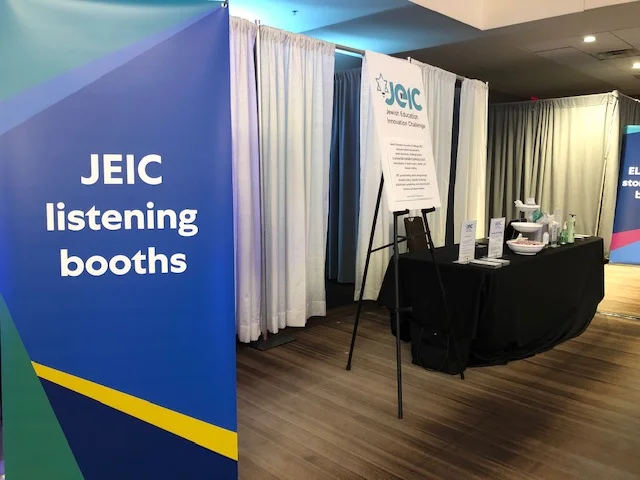Mid-March was filled with a great deal of excitement and energy for Jewish day school educators, and I’m not simply talking about the festivities associated with Purim. Prizmah: Center for Jewish Day Schools held its biannual conference in Atlanta, and I attended with my JEIC team and more than 1000 other colleagues in the field. The conference was heartening and inspiring for this diverse population of Jewish educators, funders, and influencers, evidenced by a wide range of blog articles written in the last few days and posts filling our social media feeds.
In the spirit of being a positive disruptor, JEIC conducted an audacious initiative at the conference. Taking the first page out of a design thinking playbook, we created a unique mechanism for connecting directly with Jewish educators and influencers to find out their hopes and needs.
How did we do it?
We invited conference attendees to come in for a 20-minute confidential interview in which they could share their dreams, visions, aspirations, and wishes for Jewish day schools in North America. We set up “Listening Booths,” which were draped spaces featuring a comfortable, cozy setting for two people to engage—one to talk and one to listen. We recorded the interviews and are collaborating with a professional evaluator to analyze the data in order to anticipate the trends for improving Jewish day school education with an eye toward catalyzing radical improvement, which is the core of JEIC’s mission.
And let me tell you…we heard an earful from the 51 participants representing a wide range of Jewish perspectives, practices, and schools. They shared ideas ranging from how to make schools more student-centered, community-focused, and inclusive—both academically and financially—to new ways for creating a consistent set of standards for Judaic Studies. The call was put out to address the stigma that Jewish day schools provide an inferior education to secular, independent private day schools and to elevate the profession of teaching so that the best and the brightest pursue this career path.
What struck home even more than the specific ideas were the reactions of the listening booth participants. Most of them expressed both surprise and gratitude, saying that no one had ever actually asked for their ideas or hopes before. It begs the question about how well any of us do this in our own community’s day schools and yeshivot. Do we ask parents or students about their hopes, dreams, and visions for their investment in Jewish education and the Jewish future? And even if we ask…are we truly listening with openness and curiosity or merely posing the question?
Most Jewish educators are familiar with good educational principles, such as empathetically surveying learners before beginning a project. And yet, all too often, we do not model in our own discipline that which we preach and teach.
It is time to match our actions and our processes to our espoused values. We appreciate Prizmah’s partnership with us on accelerating innovation and networking to learn within the Jewish day school community.
I, for one, am eagerly awaiting the results of the listening booth initiative. And, in keeping with my sentiments above, I ask you to share your view of what might be the best and most productive ways to communicate those results with all Jewish day school stakeholders.
Day schools are ecosystems, and in order to create great Jewish day schools, we need every perspective to shape the ways we can help schools optimize student internalization of Jewish wisdom, identity, and decision making, assuring a strong future for the Jewish people.

